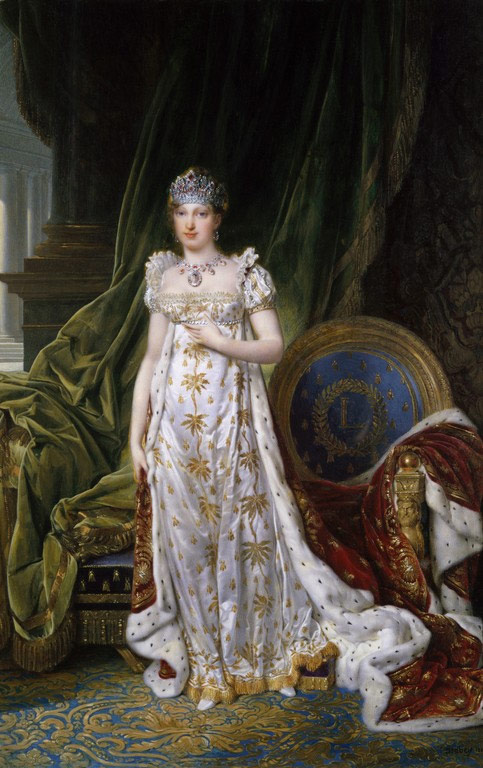Marie-Louise, Napoleon’s second, lesser-known wife, achieved great political success while exiled in Parma. She should not be forgotten, argues Deborah Jay.

Portrait in 1810 by Jean-Baptiste Isabey
Everyone has heard of Josephine. Yet it was only when Napoleon found love with Marie-Louise, Habsburg archduchess and daughter of his enemy, Austrian emperor Francis II/I, that he found true marital happiness. Despite this, next to Josephine, Marie-Louise is almost unknown.
When Josephine failed to deliver the heir Napoleon believed he needed, he looked to the leading dynasties of Europe for a second wife. Having subdued Austria for a second time in 1809, he forced Emperor Francis to surrender his eldest daughter on pain of losing his Habsburg throne.
Aged 18, highly educated, witty and caring, Marie-Louise understood the dynastic marriage market and her duty to emperor and country. As instructed, she set aside preconceptions about her husband and his countrymen and, during her tenure as empress, all would fail to engage her on the subject of her great-aunt Marie-Antoinette or any other subject that might be noxious to the Franco-Austrian alliance. She was more than a match for her overweening husband, whose misjudgments during their years together were already sowing his downfall.
Napoleon adored her from the moment he set eyes on her. Unlike Josephine, she appreciated his lovemaking and returned his affection, treasuring his gifts, attention and love-letters. In 1811, she produced the yearned-for son. Napoleon Francis was to be known as the king of Rome, Napoleon having ejected the pope and subsumed his capital into France.
Twice – in the Spring of 1813 and in January 1814 – the French emperor appointed his wife regent of France before setting out for battle, so much did he trust her good sense, integrity and loyalty to her adopted country.
Yet all unravelled in March 1814, when Napoleon’s fortunes changed and Francis and his allies laid siege to Paris. Rather than allowing Marie-Louise to stand and confront the invaders, Napoleon’s courtiers and family urged her to flee with her son to the Loire in accordance with Napoleon’s instructions. Napoleon did not summon Marie-Louise to him but told her to await her father’s decision, believing that his father-in-law was bound to favour reunion of husband, wife and child. Napoleon was wrong. Marie-Louise and her son were taken to Vienna effectively as hostages. The Austrian Chancellor, Klemens Metternich, ensured Marie-Louise never received Napoleon’s letters and that an attractive equerry was charged to detach her emotionally from him. She was forced to sit out negotiations between the Great Powers at the Vienna Congress, while Napoleon prepared accommodation for her on Elba, of which he was now king. In the Spring of 1815, she learned that Napoleon had escaped his kingdom, had seized power in Paris and demanded her return. Furious at what she perceived to be his irresponsible behaviour and unaware of his justified grievances, Marie-Louise declared her detachment from his enterprise.
As the allies proclaimed victory after Waterloo, she was rewarded by the grant of the duchies of Parma, Piacenza and Guastalla, promised her on Napoleon’s first abdication in 1814. In March 1816, she set out for Parma with her equerry, now her chief administrator. Her son, now five, was not allowed to accompany her, too dangerous a Bonaparte mascot to live on the politically volatile Italian peninsula. In Parma, living under constant threat of eviction, Marie-Louise flouted Austrian dictates and proved herself to be the most enlightened sovereign of her age, her duchies a place of refuge for many of the political dissidents of the Italian Risorgimento. Forced to lead a double life, she scandalised Europe when, upon the death of her chief administrator, the existence of her second secret family was revealed. She held on to her duchies as the fires of Italian unification became irrepressible, revolution breaking out across Europe within three weeks of her death. Her numerous achievements are still celebrated today, 200 years since she set foot in Parma.
Deborah Jay is the author of Napoleon’s Other Wife (Rosa’s Press, 2015).
Fonte: History Today

Nenhum comentário:
Postar um comentário